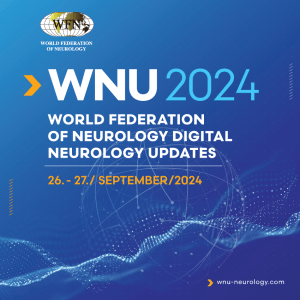The 31st Alzheimer Europe Conference (#31AEC) “Resilience in dementia: moving beyond the COVID-19 pandemic” was held from 29 November to 1 December 2021. Over 600 participants from 38 countries attended the event, which was Alzheimer Europe’s second virtual conference. On the agenda were almost 300 presenters (160 oral presentations, 137 quick oral presentations and 35 poster presentations), who shared their research, projects and experiences in an atmosphere of collaboration and solidarity.
Conference co-hosts Kim Coppes from Live Online Events and Jean Georges, Executive Director of Alzheimer Europe welcomed the delegates from the conference studio in Utrecht, Netherlands, which was their base throughout the event.
Iva Holmerová, Chairperson of Alzheimer Europe, officially opened the conference and extended a special welcome to the 37 people with dementia who were among the delegates, as well as their supporters. “As Chairperson of Alzheimer Europe, I have truly been in awe at how the European dementia community has risen to the challenge of the pandemic and identified new and innovative ways to support, care and conduct research”, she said.
Following these opening words, delegates were also welcomed by Chris Roberts, Chairperson of the European Working Group of People with Dementia (EWGPWD) and Marjolein de Vugt, Chairperson-elect of the INTERDEM network, followed by a video message from Hans Kluge, WHO Regional Director for Europe.
Chris Roberts addressed delegates from his perspective as a person living with dementia and as the Chairperson of the EWGPWD. He welcomed everyone to the conference and reflected on the importance of the EWGPWD and on how the group brings together people from different countries, giving an international voice for those living with dementia. “Nothing About Us Without All of Us”, he reminded delegates, insisting that we all need to work together to promote a better quality of life for those affected by dementia and to help reduce the population’s risk of getting dementia. “We are doing our best to live with dementia, not dying from it”, he said and stressed that with support and understanding, people living with dementia can all live better lives.
Marjolein de Vugt spoke on behalf of INTERDEM (Early detection and timely INTERvention in DEMentia). She highlighted that current circumstances challenge us; our resilience; our creativity and more than ever require our commitment to care. “Alzheimer Europe strengthens the voices of people with dementia not only to influence practice and policy but also to influence research. INTERDEM has reaped the benefits of this, for example by working closely with the European working group of people with dementia in several research projects”, she stated. Young researchers are our future and the INTERDEM Academy fosters their talent and supports them in their pathway to senior positions in the field. The combined INTERDEM meeting and Alzheimer Europe Conference are a fantastic opportunity for them to present their work and to build their networks.
In a pre-recorded video message to conference delegates, the WHO Regional Director for Europe Hans Kluge highlighted that dementia was the “leading cause of dependency and disability among older people in the WHO European region” and that WHO/Europe is therefore happy to be working closely with Alzheimer Europe and other European partners on the implementation of the Global Action Plan on the public health response to dementia (2017-2025). He added that “crises bring about change and COVID-19 is no exception, systemic flaws in our health systems have been exposed”. For European countries, COVID-19 has been a “seismic shift in terms of healthcare” and for that reason, he called on delegates to identify good practices and learnings to improve the situation of people with dementia and their carers in Europe.
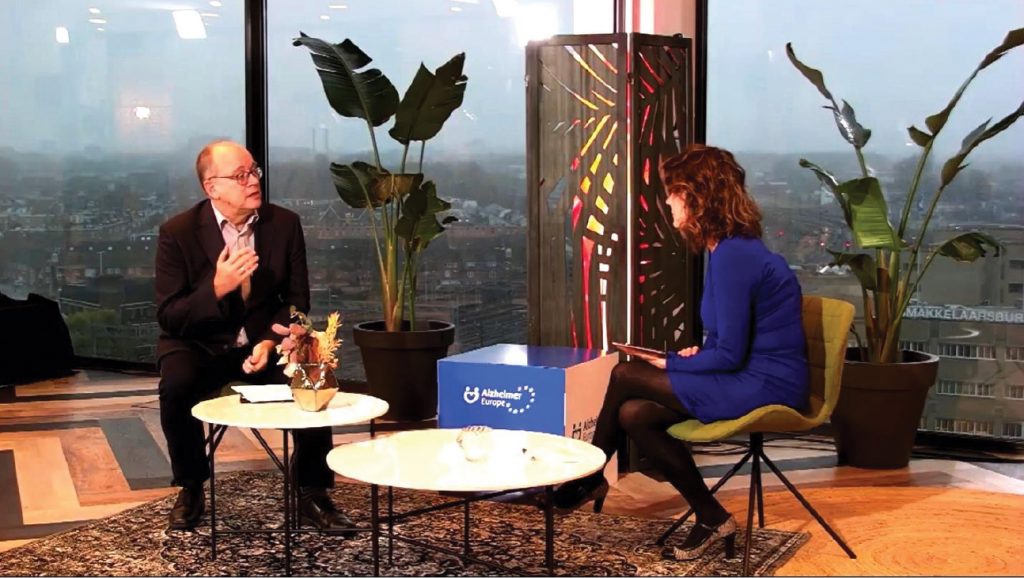
Resilience in dementia – adapting to the COVID-19 pandemic as a dementia advocate
The opening ceremony was followed by a short plenary session in which the first of two keynote presentations was delivered (the other to take place on the last day of the conference). In his keynote presentation, which focused on resilience and adapting to the COVID-19 pandemic as a dementia advocate, Kevin Quaid, Vice-chairperson of the EWGPWD addressed the people with dementia in the audience. He emphasised the importance of making sure to have a specific diagnosis. “To be told that you ‘have dementia’ or have ‘a touch of dementia’ is not a proper diagnosis” he said. He also stressed the need to make sure that whatever medication a person is on, it is suitable for their particular type of dementia. “A wrong diagnosis can lead to wrong medication”, he pointed out. Overall, his message to people with dementia everywhere was to “Try and keep a positive mental attitude and try and keep your brain active. That is exactly why I am doing as well as I am after eight years with Lewy Body Dementia.”
Poster presentations, Quick Oral Presentations and Parallel sessions
Following the opening ceremony and the keynote lecture, delegates had the chance to join one of four parallel sessions. There was one on the topic of adapting day and community care and one on arts and culture. The NEURONET initiative (Efficiently Networking European Neurodegeneration Research) organised the third session, and the fourth parallel session was organised by INTERDEM entitled “Leaving University after PhD? Opportunities and experiences across sectors”.
A further four parallel sessions followed this, until 17.15 CET. One session looked at lessons learned from the COVID-19 pandemic, in nursing and residential care, while another focused on gender and sexuality in dementia. The other two, again, were organised by NEURONET and INTERDEM, while from 17:30 to 18:30, the RECage project (REspectful CAring for the AGitated Elderly) held a Special Symposium.
There was also the opportunity to view a number of poster presentations and Quick Oral Presentations between the hours of 13.00 and 18.45 each day of the conference.
Prior to the conference, Alzheimer Europe Director for Projects Dianne Gove and Project Officer Ana Diaz hosted two online information sessions for delegates living with dementia, to show them around the conference platform and how to use it.

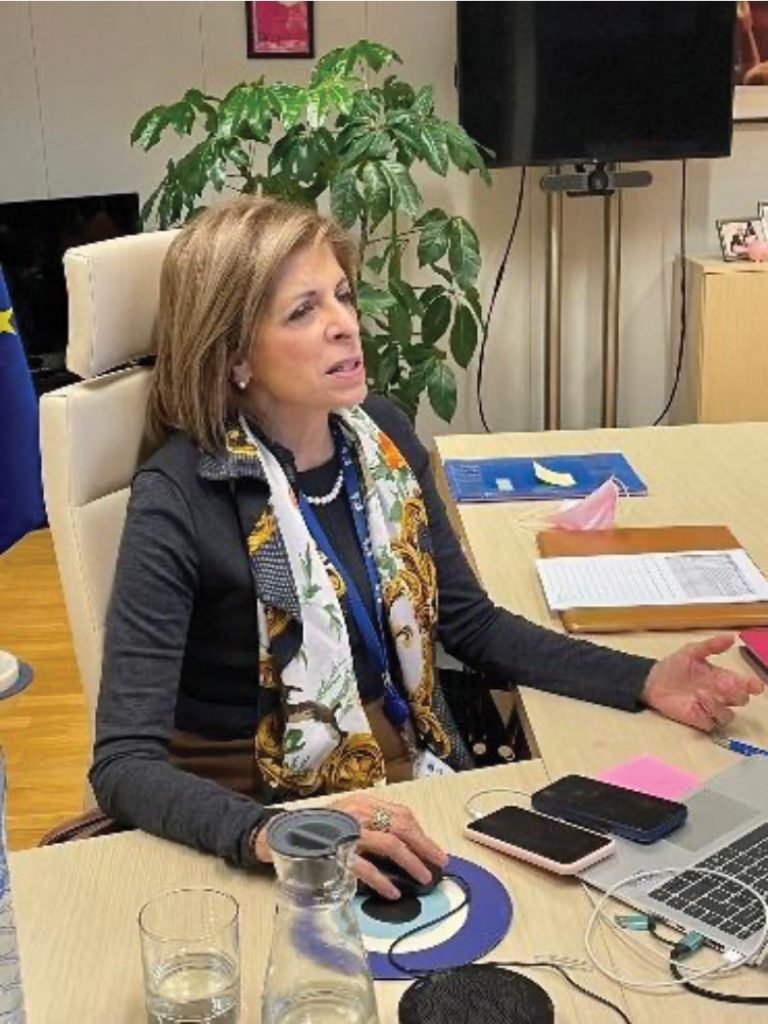
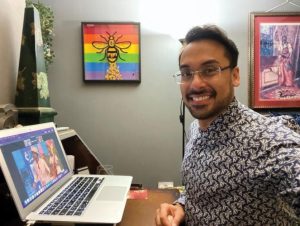
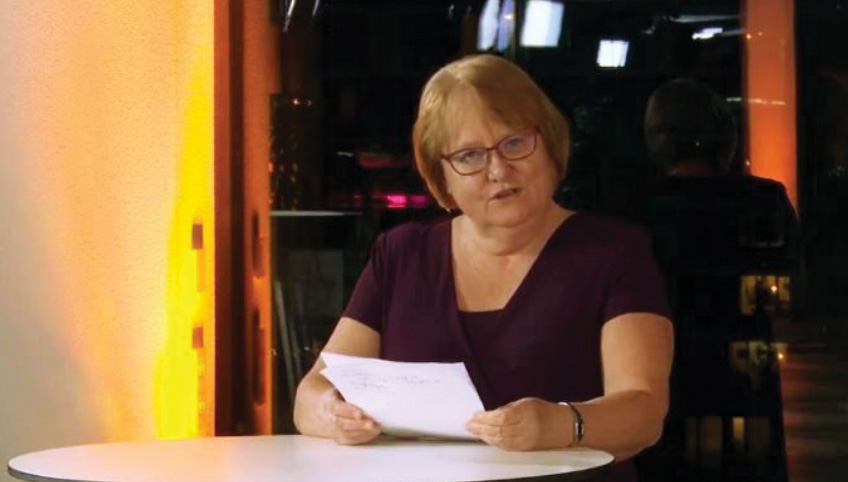
Lessons from the COVID-19 pandemic
The second plenary of the conference was on “Lessons from the COVID-19 pandemic” and opened with a presentation on “Reinventing counselling and home support during the pandemic”, given by Jim Pearson, Director of Policy and Practice, Alzheimer Scotland and Board member and Honorary Secretary of Alzheimer Europe. He began by noting that the disruption to daily routines, social interactions, and health and social care support during this pandemic has had a disproportionately negative impact on the physical and mental health of people with dementia and carers. He also noted that it is critical to have greater balance between public health measures in order to restrict the spread of COVID-19 and the harm we know those measures cause. “We know what we need to do”, he stated. “People with dementia, their families and carers, need action now. They do not have time to wait for the lessons of this pandemic to be learned.”
During the next presentation, on “Protecting people with dementia in residential care – what we did right and what we got wrong!”, Pat McLoughlin, CEO, The Alzheimer Society of Ireland (ASI) noted that, whilst many countries have data that shows dementia was one of the main underlying conditions for deaths during COVID, there is no concrete information on the extent to which this is the case in Ireland. He also stressed that the ASI felt that more could have been done by the Nursing Homes Expert Group or Government Special Committee to highlight the particular challenges faced by people with dementia during the pandemic. On the other hand, the ASI welcomed the practical measures and resources announced by the Government in home care supports and a more integrated community-based approach for people with dementia and their carers.
In the third and final presentation, Miia Kivipelto, Director of Research, Development, Education and Innovation, Karolinska University Hospital, Karolinska Institutet, discussed multimodal prevention studies and lifestyle changes during the pandemic. As the coordinator of the global World-Wide FINGERS network and the EURO-FINGERS project, she noted that the pandemic has had significant effects on many modifiable risk factors for dementia and Alzheimer´s disease (AD), and on ongoing randomised clinical trials for dementia risk reduction and prevention. Negative effects of the pandemic include direct consequences of the COVID-19 disease, and indirect effects due to disruption of regular healthcare services, social and physical distancing or mobility restrictions imposed by several countries to curb the spread of the infection.
Following this plenary session, delegates had the chance to join a choice of four parallel sessions: One on maintaining dementia as a public health priority; another on rehabilitation in dementia; the third by Brain Health Scotland on the importance of physical activity, sport and nutrition for brain health; and the final one by the Deutsches Zentrum für Neurodegenerative Erkrankungen (DZNE) on ethnic minorities.
European Working Group of People with Dementia (EWGPWD): “Resilience and dementia”
One of the highlights of the second day of the virtual Alzheimer Europe Conference was a special symposium organised by the European Working Group of People with Dementia (EWGPWD). Three members of the group made videos for the symposium: Margaret McCallion from Scotland, Nigel Hullah from England and Erla Jόnsdόttir from Iceland who was accompanied by her husband and supporter and Emil Emilsson. The three speakers shared their views about resilience as part of living with dementia and also shared their experiences of living and coping with dementia during the pandemic, and how it affected them. A live question and answer session with the three speakers followed, moderated by Chris Roberts, Chairperson of the EWGPWD.
Following this and the symposium on “Building Resilience in Health Systems for People with AD: Early Detection and Timely Diagnosis in a COVID-19 World” organised by Roche in the early afternoon, delegates had the choice of a further four parallel sessions, covering mental health and dementia during the pandemic; intergenerational dementia initiatives; another session organised by the NEURONET initiative; and another by the INTERDEM network.
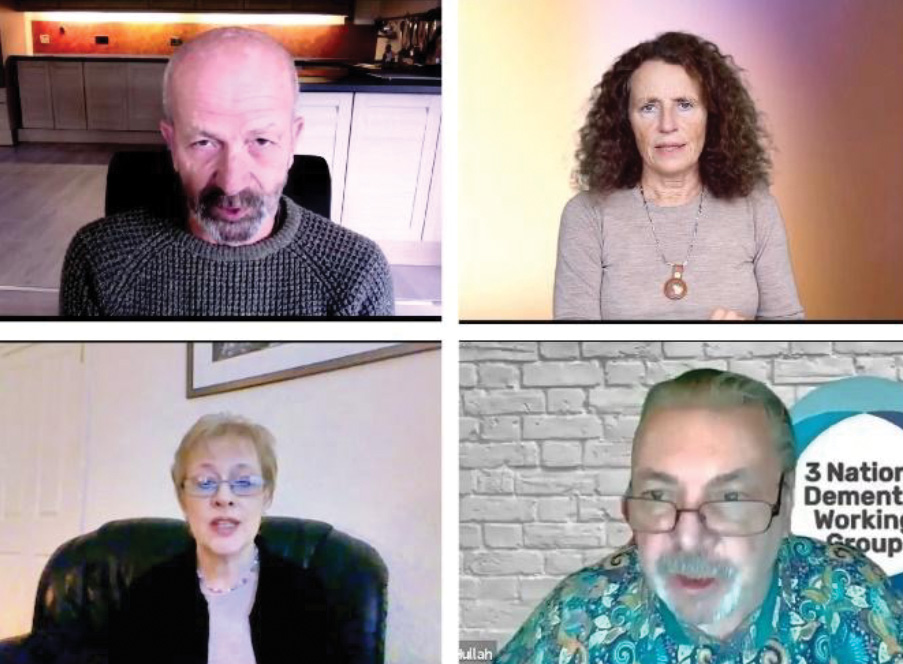
Innovations in dementia diagnosis and care through new technologies
The third plenary of the conference explored “Innovations in dementia diagnosis and care through new technologies”. Martin Traber, Global Medical Lead Alzheimer’s Disease, Roche, opened with a presentation on the importance of flexible care settings and home care management in clinical trials within a rapidly changing COVID-19 environment. He said that the pandemic has highlighted the levels of inequality in healthcare systems, showing us how this had catastrophic effects in the dementia community and forced us to be more “pandemic prepared” for the future. “Flexibility will be fundamental to all future efforts to improve outcomes for people with Alzheimer’s disease, including how clinical trials are run and how patient care is delivered”, he stated.
Finally, he stressed that the responsibility of Roche had grown through their learnings around COVID-19, as well as when it comes to Alzheimer’s disease. According to him, partnerships and collaborations will be key to improving the readiness of healthcare systems worldwide.
Adrian Wagg, Professor of Healthy Ageing, Department of Medicine, University of Alberta, Canada discussed ways of improving continence care for nursing home residents, thanks to new technologies. Urinary incontinence is common in people living with dementia and is a cause of considerable distress, he said, and yet it is often overlooked. It is a major contributor to care-partner distress and a significant contributor in decisions to institutionalise persons living with dementia, he stressed and noted also that the management of urinary incontinence is often suboptimal and there is great potential for improvement, using a number of promising technological solutions.
The third presentation of this plenary session was given by Petra Ritter, Johanna Quandt Professor for Brain Simulation at the Berlin Institute of Health, Charité University Medicine Berlin, Germany. She presented on “Augmenting diagnosis, inferring mechanisms, and predicting intervention outcomes in neurodegenerative disease through personalised Virtual Brain Cloud simulations”. Constructing and simulating individual models of the brain, or “digital twins”, is a powerful tool for innovation and personalised medicine, she said. These digital twins help us to understand mechanisms of brain function and dysfunction, which will allow us to develop measures for prevention and therapies. The Virtual Brain Cloud – a project of the European Open Science Cloud (EOSC) and a Partnering Project of the Human Brain Project and EBRAINS – provides a digital platform that enables collaborative research on sensitive health data in an audited environment that is compliant with the General Data Protection Regulations (GDPR) of the EU and thus protects the rights and the freedom of the data subjects and patients. “The European Health Data Space will lift data-driven clinical research to a fundamentally new level”, she said, and in closing highlighted that they are working towards an ecosystem of interoperable health data infrastructures – co-designed by the research communities involved in this project.
Following this, an address was given to the delegates by Stella Kyriakides, European Commissioner for Health and Food Safety. “To effectively meet the needs of dementia patients, we must first understand them. It is vital to reach out to them, their families as well as to informal carers, who make an incredible contribution to our communities every day”, she said. “We are constantly learning about the human brain. Through its Framework Programmes for Research and Innovation, the EU will continue investing in effective prevention, better diagnostics and game changing treatments or cures. These will make a true difference for dementia patients across the Union”, she concluded.
The second day of the Virtual Alzheimer Europe Conference drew to a close with two symposia, one on “The road behind and the road ahead: measuring the performance of 10 European governments on Alzheimer’s disease”, organised by the Global Coalition on Aging (GCOA) and the other on “The Importance of Sharing Global Alzheimer’s Disease Data in Search of Novel Treatments and Cures” organised by the Alzheimer’s Disease Data Initiative (ADDI).
Inclusive dementia care: the needs of the LGBTQ+ community
The third and final day of the conference opened with the second of two keynote presentations, which focused on inclusive dementia care and particularly on the needs of the LGBTQ+ community. Patrick Italo Ettenes (He/She) Co-Founder of Bring Dementia Out emphasised the importance of considering some of the real experiences of LGBTQ+ people living with dementia, noting that many organisations are still heteronormative and cis-oriented (cisgender/cissexual/cis describes a person whose gender identity is the same as their sex assigned at birth). The need to be aware of issues around next of kin for LGBTQ+ people, who are often excluded from care decisions and who face fear of discrimination around their sexual and/or gender identities, was also highlighted. Patrick Ettenes implored representatives of dementia organisations and service providers in attendance at the conference, to ensure they understand how to support LGBTQ+ people living with dementia and provide appropriate information for those who are currently not having their needs met.
Dementia as a public health challenge
The fourth plenary session focused on dementia as a public health challenge. Hana Marie Broulíková, Department of Health Sciences, Vrije Universiteit Amsterdam, and Coordinator of the national dementia strategy at the Czech Ministry of Health opened with a talk on “Keeping dementia as a health priority during the COVID-19 pandemic”. A dementia strategy, she said, is more likely to be pursued when it is incorporated within wider public health policy. The Czech strategy is being implemented as part of a major reform of mental health care. She also stressed that, in order to effectively communicate and accommodate the needs of people with dementia and carers in crisis situations such as the ongoing pandemic, an advisory governmental committee consisting of a wide range of stakeholders is necessary.
Up next, Maria-Teresa Ferretti, Co-founder and Chief Scientific Officer, Women’s Brain Project, Switzerland, examined the question of whether we are getting better at taking sex and gender differences into account in Alzheimer’s care. Sex (biological) and gender (socio-cultural) differences in Alzheimer’s disease are particularly relevant in the individual’s diagnostic pathway and medical journey, she noted. For example, she pointed out that of the 12 modifiable risk factors for dementia identified by the Lancet Commission in 2020, several are more common in women, including low level of education and depression. “Considering sex- and gender-specific factors is a key step to improve access to and precision of diagnosis of Alzheimer’s disease”, she stated, noting also that a paradigm shift towards precision neurology would “optimise the diagnostic pathway and the individual’s medical journey.”
In the third presentation, Gill Livingston, Professor at University College London, explored preventable causes of dementia and their public health implications. Worldwide, 40% of dementias may be preventable by addressing 12 risk factors, with half of that risk being accounted for by hearing loss, lower levels of education and smoking, she began. She highlighted that dementia risks cluster in people with fewer socioeconomic resources and in minority ethnic groups and stated that “the potential for prevention is high everywhere and particularly so in more deprived groups and in low and middle-income countries”.
Following the morning plenary session, delegates were again given the option to join one of four possible parallel sessions. The first two covered new ways of diagnosing dementia and of recruiting and assessing research participants; and young onset dementia. The third was organised by the bPride and MIRIADE projects and looked at fluid biomarkers as strategic tools for counteracting dementia; while the last one, jointly organised by the European Academy of Neurology (EAN) and the European Alzheimer’s Disease Consortium (EADC), was on “MCI: diagnosis, disclosure and management”.
In the early afternoon, Brain Health Scotland held a Special Symposium bringing together world-leading experts to discuss the most up-to-date knowledge on themes important for maintaining brain health and reducing risk of dementia, with a particular focus on physical activity, sport and nutrition. Simultaneously, TauRx Therapeutics held a Special Symposium on “Late-stage clinical trial conduct during COVID-19: challenges, lessons, and the future for Alzheimer’s disease management”.
The final four parallel sessions of the conferences took place, between 14.15 and 15.30 CET, the first two of which were on telecare and counselling; and risk factors and prevention. The two other sessions were organised by NEURONET and by the INTERDEM network.
Beyond the pandemic: Reinventing dementia care and treatment
The fifth and final plenary session took the form of a roundtable discussion and the discussion topic was “Beyond the pandemic: Reinventing dementia care and treatment”. Participating in the discussion Craig Ritchie, Director of the Edinburgh Centre for Dementia Prevention and Brain Health Scotland; Lutz Frölich, Head of the Department of Geriatric Psychiatry at the Central Institute for Mental Health in Mannheim and Chair of the European Alzheimer’s Disease Consortium and Marjolein de Vugt, Professor at the Alzheimer Center Limburg, Maastricht UMC+.
Panellist Craig Ritchie drew attention to the fact that the COVID pandemic had illustrated continued challenges, with the priority (or lack thereof) given in health and social care systems to people living with dementia. Study set-up and delivery in platform trials realised the value of platform trials, he said, but said that the months and even years we wait for study set-up is completely unacceptable. He also highlighted that the pandemic shed some light on just how potent social isolation can be on cognitive decline and suggested that while digital and remote assessment could be a great complement to face-to-face meetings, they should never be a replacement for them.
During the discussion Lutz Frölich emphasised the need to put the wealth of scientific evidence that has been generated, into clinical practice. Drugs currently in development and undergoing evaluation by the European Medicines Agency target the ‘proteinopathy’ of Alzheimer’s disease, reducing amyloid plaques in the brain. They change the underlying biological process of the disease; however, the diagnostic process is highly complex and not all people who have mild cognitive impairment (MCI) would be eligible, he said. On top of this, the process of proving the presence of amyloid, necessary to be eligible for this type of treatment, is burdensome on both patient and physician. Many things are still unclear including whether the EMA will approve the treatment for European countries at all. Other antibodies are currently in development, one or more of which may be approved in the coming years, he said, which would require some fairly important changes in medical systems. It is imperative that healthcare systems are prepared for this.
Marjolein de Vugt emphasised that a timely diagnosis can create opportunities for psychosocial prevention to improve the well-being of people with dementia and caregivers, while facing the daily social and cognitive challenges of dementia. She also noted that an important future challenge in research is “to make dementia care increasingly precise and fully situated in a specific context at a specific point in time and to improve implementation of innovations in practice”. She pointed out that technological innovations such as e-health can help us advance such personalised approaches in dementia.
Goodbye, virtual world. Hello, Bucharest!
During the closing ceremony, delegates were invited to listen to a rendition of songs by the Irish Forget-Me-Nots choir, an inclusive community choir for older people that is especially welcoming to people affected by dementia. Norah Walsh, the Musical Director of the Choir gave an update on the history of the choir and how it adapted to the pandemic.
The three-day virtual conference was formally closed by Alzheimer Europe Chairperson Iva Holmerová who thanked the presenters and delegates for joining, the organising and programme committees and all conference sponsors, for making the event possible, and in particular, she expressed her gratitude to the health programme of the European Union and the corporate sponsors of the conference: AbbVie, ADDI the Alzheimer’s Disease Data Initiative, Biogen, Roche and TauRx Therapeutics. She also singled out the fantastic collaboration that Alzheimer Europe has developed with the INTERDEM network which was, as every year, strongly represented at the conference. All delegates were invited to mark the dates of the next Alzheimer Europe Conference (#32AEC) in their calendars. “Building bridges” will take place in Bucharest, Romania from 5 to 7 December 2022.
The 31st Alzheimer Europe Conference received funding under an operating grant from the European Union’s Health Programme (2014-2020).

